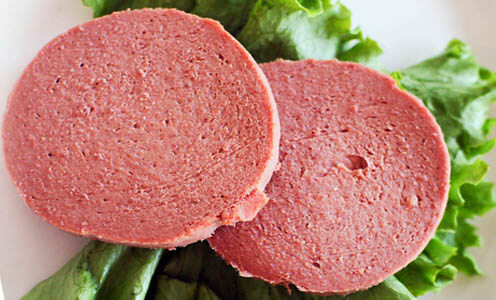The short answer? Maybe, but proceed with caution. While dog liverwurst safety isn’t an absolute “no,” it’s definitely not a free pass. Braunschweiger for dogs presents a complex scenario, blending potential benefits with significant health risks. Let’s explore why feeding dogs processed meat like liverwurst demands careful consideration.

Unpacking Liverwurst: What’s Really Inside?
Before offering liver sausage dog treat, let’s understand what goes into it. Liverwurst, also known as Braunschweiger, is a type of sausage primarily made from pork liver. However, the recipe doesn’t stop there. Recipes can vary widely. Other ingredients may include:
- Pork
- Bacon
- Onions
- Spices (like nutmeg, pepper, marjoram)
- Nitrites or Nitrates (for preservation and color)
- Sugar or other sweeteners
- Milk powder
- Sometimes, even smoke flavoring
That list alone should raise some flags for pet owners. Not all of these ingredients are benign for dogs.
The Good, the Bad, and the Liver-ly: Nutritional Value for Dogs
Liver itself, the primary ingredient, does offer some liverwurst nutritional value for dogs. It’s packed with:
- Vitamin A: Essential for vision, immune function, and cell growth.
- B Vitamins: Including B12, crucial for nerve function and red blood cell production.
- Iron: Important for carrying oxygen in the blood.
- Trace Minerals: Such as copper and zinc, vital for various bodily functions.
However, the other ingredients in liverwurst significantly dilute these benefits. Plus, you can get those same benefits without the additional dangers through much safer whole food options.
The Danger Zone: Why Liverwurst Can Be Risky Business
So, if liver is good, what’s the problem? Here’s where the dog liverwurst safety concerns come in:
Toxic Ingredients
- Onions: Highly toxic to dogs, even in small amounts. They damage red blood cells, leading to anemia.
- Garlic: While less toxic than onions, garlic can still cause similar problems if ingested in large quantities.
- Spices: Many spices can upset a dog’s stomach. Nutmeg, in particular, can be toxic in high doses.
High Fat Content
Liverwurst is notoriously high in fat. This can cause:
- Pancreatitis: An inflammation of the pancreas, leading to severe abdominal pain, vomiting, and diarrhea.
- Weight Gain: Contributing to obesity and related health problems like diabetes and joint issues.
Sodium and Preservatives
- High Sodium: Can lead to dehydration and, in severe cases, sodium ion poisoning.
- Nitrites/Nitrates: These preservatives have been linked to cancer in humans, and their long-term effects on dogs are still being studied.
Potential Allergens
- Dairy: Many dogs are lactose intolerant. Milk powder in liverwurst can trigger digestive upset.
- Other Ingredients: Preservatives, fillers, or certain spices could also cause allergic reactions.
Is Liverwurst Toxic to Dogs? The Specific Risks
While liverwurst isn’t inherently is liverwurst toxic to dogs in the same way that chocolate or antifreeze is, it’s a potentially dangerous food due to the toxic ingredients and unhealthy levels of fat and sodium it contains. The dangers are dose-dependent. A tiny, incidental nibble is less concerning than a significant portion. However, it is best to avoid it all together.
Can Dogs Digest Braunschweiger? Digestibility and Sensitivity
The question, ” can dogs digest braunschweiger?” is a bit nuanced. Dogs can technically digest the meat components of liverwurst. However, the issue is not digestibility, but rather tolerance. The high fat content, spices, and potential allergens can cause digestive distress. Dogs with sensitive stomachs are particularly vulnerable. Signs of digestive upset might include:
- Vomiting
- Diarrhea
- Loss of appetite
- Lethargy
- Increased gas
Safe Meat for Dogs: Healthier Alternatives
Instead of risking it with liverwurst, consider these safer safe meat for dogs options:
- Cooked Chicken or Turkey (boneless, skinless): Excellent source of lean protein.
- Lean Ground Beef (drained of excess fat): Another good protein source.
- Cooked Fish (salmon, cod, tuna – boneless): Rich in Omega-3 fatty acids, beneficial for skin and coat health.
- Organ Meats (in moderation): If you want the benefits of liver, feed plain cooked liver in very small quantities.
How Much Liver Is Too Much? Establishing Limits
If you decide to feed your dog liver, moderation is key. Liver is very rich in Vitamin A, and too much Vitamin A can lead to hypervitaminosis A, a serious condition that can cause bone and joint problems. A general guideline is that liver should constitute no more than 5-10% of your dog’s daily diet.
For example, a 50-pound dog that eats 1000 calories a day should get no more than 50-100 calories from liver.
A Better Approach: Homemade Liver Treats
If you want to give your dog a liver-based treat, the safest option is to make your own. This way, you can control the ingredients and avoid harmful additives. Here’s a simple recipe:
Homemade Liver Treats
Ingredients:
- 1 pound of beef or chicken liver
- 1 cup of whole wheat flour (or oat flour for a gluten-free option)
- 1 egg
Instructions:
- Preheat your oven to 350°F (175°C).
- Boil the liver until it is cooked through.
- Let the liver cool slightly, then cut it into small pieces.
- Blend the liver, flour, and egg in a food processor until smooth. Add a little water if the batter is too thick.
- Spread the mixture onto a lightly greased baking sheet.
- Bake for 15-20 minutes, or until the treats are firm.
- Let the treats cool completely before cutting them into small pieces.
- Store in an airtight container in the refrigerator for up to a week, or in the freezer for longer storage.
Decoding Labels: Understanding Braunschweiger Ingredients
Before feeding any processed food to your dog, scrutinize the ingredient list. When looking at braunschweiger ingredients dog, here’s what to watch out for:
| Ingredient | Why It’s Concerning | Safer Alternative |
|---|---|---|
| Onions/Garlic | Toxic to dogs, damages red blood cells. | Avoid entirely. No safe substitute. |
| Spices | Can cause digestive upset, some (like nutmeg) are toxic in large amounts. | Plain, unseasoned meat. |
| Nitrites/Nitrates | Potential carcinogens. | Fresh, unprocessed meat. |
| High Sodium | Can lead to dehydration and sodium ion poisoning. | Low-sodium meat options or homemade treats with no added salt. |
| Dairy | Can cause digestive upset in lactose-intolerant dogs. | Dairy-free alternatives (if needed for the recipe). |
| Fillers (e.g., corn, soy) | Can trigger allergies or sensitivities in some dogs. Also, nutritionally empty. | Meat-based treats or treats with simple, easily digestible ingredients. |
| Artificial flavors/colors | Unnecessary and potentially harmful additives. | Avoid. |
Dog Diet Liverwurst: Integrating Safely (If You Must)
If you’re still considering incorporating a small amount of liverwurst into your dog diet liverwurst, here are some guidelines:
- Consult Your Vet: Discuss your dog’s specific health needs and potential risks with your veterinarian.
- Tiny Portions Only: If given at all, offer only a very small, pea-sized amount as a rare treat.
- Read Labels Carefully: Choose a brand with the fewest questionable ingredients.
- Monitor for Reactions: Watch your dog closely for any signs of digestive upset or allergic reactions.
- Don’t Make It a Habit: Liverwurst should never be a regular part of your dog’s diet.
Making Informed Choices: A Matter of Prioritization
Ultimately, braunschweiger for dogs is a food that’s best avoided. While it contains some beneficial nutrients, the risks associated with its ingredients and high fat/sodium content outweigh any potential benefits. Prioritize your dog’s health and well-being by opting for safer, healthier treat options.
Frequently Asked Questions (FAQ) About Dogs and Liverwurst
- Can puppies eat liverwurst? No. Puppies are more sensitive to dietary changes and toxins. Avoid feeding liverwurst to puppies.
- What if my dog ate a large amount of liverwurst? Contact your veterinarian immediately. Watch for signs of poisoning or pancreatitis.
- Is there any brand of liverwurst that is safe for dogs? Even “high-quality” brands still contain ingredients that can be harmful. It’s best to avoid all brands.
- Can I give my dog liver instead of liverwurst? Yes, plain cooked liver (beef, chicken, or pork) is a much safer option, but only in moderation due to its high Vitamin A content.
- What are some healthy treat alternatives for dogs? Carrot sticks, apple slices (without seeds), blueberries, sweet potato chews, and commercially available dog treats with simple ingredients.
- What do I do if my dog ate liverwurst and is now sick? Consult with your vet immediately.
- Are there any benefits to feeding liverwurst to my dog? There are some benefits to feeding plain cooked liver to your dog, but the health detriments of processed liverwurst outweigh any possible advantages.
- Can I make liverwurst myself for my dog? Yes, but it defeats the purpose, as the ingredients you’d need to add to make it actually taste like liverwurst are not safe for dogs. It would be better to just feed plain liver.

